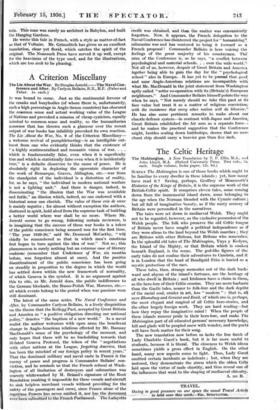The Celtic Heritage
SURELY The Mabinogion is one of those books which ought to be familiar to every dweller in these islands ; yet, how many have read it ? Saving, perhaps, Geoffrey of Monmoutlett Histories of the Kings of Britain, it is the supreme work of the British-Celtic spirit. It comprises eleven tales, some coming down from the immemorial island dawn, some belonging to the age when the Norman blended with the Cymric culture but all full of imaginative beauty, as if the misty scenery of Britain were personified in the narratives.
The tales were set down in mediaeval Welsh. They ought not to be regarded, however, as the exclusive possession of the Welsh people. The folk who preserve the old Celtic tongue of Britain never have sought a political independence as if they were aliens to the land beyond the Welsh marches ; they are Britons with other Britons, but Britons who remember. In the splendid old tales of The Mabinogion, Ynys y Kedyrif, the Island of the Mighty, or that Britain which is sunken beneath England, is' the scene. The god-like figures of the early tales do not confine their adventures to Cambria, and it is in London that the head of Bendigaid Fran is buried as mystic protection of the race.
These tales, then, strange memories out of the dark back-,
ward and abysm of the island's fortunes, are the heritage of all who dwell in Britain ; and Irishmen have a claim in them, as the hero-lore of their Celtic cousins. They are more barbaric than the Gaelic tales, nearer to folk-lore and the dark depths of the racial soul, cruder in art, less " modern " : that is, all save Rhonabwy and Geraint and Enid, of which one is, perhaps, the most elegant and magical of all Celtic hero-stories, and the other largely foreign work. They are hard reading—but how they repay the imaginative mind ! When the people of these islands recover pride in their hero-lore, and make The Mabinogion part of all educated persons' necessary knowledge; hill and glade will be peopled anew with wonder, and the poets will have fresh matter for their song. The new translation now before us lacks the fine finish of
Lady Charlotte Guest's book, - but it is far more useful to students, because it is literal. The closeness to Welsh idiom sometimes yields a gross effect in English. On the othei hand, many new aspects come to light. Thus, Lady Guest omitted certain incidents as indelicate ; but, when they are restored, they demonstrate the stress which the olden Celts laid upon the virtue of male, chastitY, and thus reveal one cif
the influences that went to the shaping of mediaeval chivalry.
A. DE B.










































 Previous page
Previous page